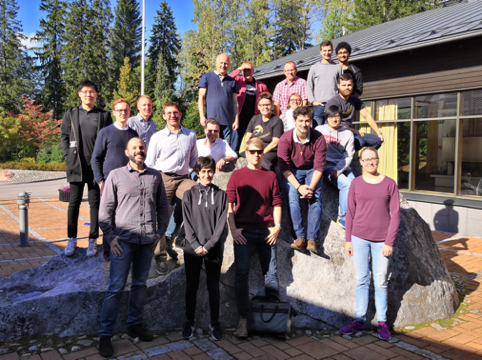CECAM-Aalto workshop Hvittorp 13-14.9. 2018
CECAM-Aalto sponsored workshop on
Thermostat-related Artefacts in Molecular Dynamics Simulations
13-14 September 2018, Hvittorp, Finland
The workshop will last two days and we have a total number of participants of 21, including members of the computational aerosol physics group.
Venue: Hvittorp, Hvittorpintie 243, Kirkkonummi, Finland.

In order to relate time averages in equilibrium Molecular Dynamics simulations (MD) to thermodynamic quantities in constant temperature ensembles (NVT or NPT) it is necessary to employ thermostats that mimic the effect of a heat bath. The role of the thermostat is to maintain the correct Boltzmann distribution of particle velocities and fluctuations of kinetic energy in the system. It is to be noted, that in their standard form, thermostats represent a heat bath that is in equal contact with all particles the system. In several applications of MD simulations, where the system is not in equilibrium either because work is performed on the system, or the system is undergoing a first order phase transition, applying a standard thermostat may lead to serious artefacts. As one example, simulations of ice nucleation[1, 2] are typically performed at constant temperature or at constant rate of cooling by a thermostat. This allows accurate determination of ice nucleation rates or temperatures, but also causes improper treatment of latent heat release from the growing ice crystal. We have recently shown that there is a noticeable effect from latent heat both on ice growth rate and structure, if it is allowed to locally heat the system before being conducted further away from the nucleation site. Another example of a first order phase transition is atmospheric cluster formation. Here, MD is a useful tool for studying these processes, because the cluster formation is not constrained to equilibrium conditions. However, the thermalization of the clusters should be treated accordingly: in simulations of homogeneous vapour-liquid nucleation the traditional thermostats transfer heat from/to the clusters in an unphysical manner and instead of a thermostat, the best procedure is to use actual carrier gas to control the temperature of the clusters [3-5].
The purpose of this workshop is to bring together the experts from different computational fields, such as ice nucleation, atmospheric particle formation, or biophysics, to discuss common problems and questions related to thermostat-related artefacts in simulations and to explore suitable solutions together.
Workshop schedule:
Thursday 13. September 2018
10:00 Start of workshop
10:30 – 12:00 Scientific program – part 1
Bernhard Reischl - Thermostats and barostats in Molecular Dynamics simulations
Junlei Zhao - Molecular dynamics of nanoparticle growth in inert gas phase and role of thermostat
12:00 – 13:00 Lunch
13:00 – 14:30 Scientific program – part 2
Paolo Raiteri - Thermodynamics of a first order phase transition from MD
Zheyong Fan - Molecular Dynamics Simulation of Heat transport
14:30 – 15:00 Coffee
15:00 – 17:00 Scientific program – part 3
Poster session
17:15 – 18:00 Dinner
19.30 – Evening snack available
20:00 – 22.00 Sauna by the lake
Accommodation at Hvittorp
Friday 14. September 2018
08:00 – 09:00 Breakfast
09:00 – 10:30 Scientific program – part 4
Simone Meloni - Pressure control in interfacial systems
Roope Halonen - Deviation from equilibrium conditions in molecular dynamic simulations of homogeneous nucleation
10:30 – 10:45 Morning coffee
10:45 – 12:15 Scientific program – part 5
Olli Pakarinen - Thermostat artefacts and role of latent heat in ice nucleation
Evgeni Zapadinski - Thermostatting in complex systems. Merging with probabilistic approach
12:15 – 13:15 Lunch
13:15 – 15:30 Short excursion with a church boat (12 rowers) to Hvitträsk, an architecture museum. Guided by Elämystorppa.
15.30 – 16:00 Coffee
16.00 End of workshop and departure to Helsinki
Confirmed Speakers
Paolo Raiteri (Curtin University, Western Australia) - Thermodynamics of a first order phase transition from MD
Simone Meloni (University of Rome - "La Sapienza", Italy) - Pressure control in interfacial systems
Junlei Zhao (Accelerator Laboratory, University of Helsinki) - Molecular dynamics of nanoparticle growth in inert gas phase and role of thermostat
Zheyong Fan (Aalto University, Finland) - Molecular Dynamics Simulation of Heat transport
Roope Halonen (INAR, University of Helsinki) - Deviation from equilibrium conditions in molecular dynamic simulations of homogeneous nucleation
Olli Pakarinen (INAR, University of Helsinki) - Thermostat artefacts and role of latent heat in ice nucleation
Bernhard Reischl (INAR, University of Helsinki) - Thermostats and barostats in Molecular Dynamics simulations
Evgeni Zapadinski (INAR, University of Helsinki) - Thermostatting in complex systems. Merging with probabilistic approach
Other participants
Tapio Ala-Nissilä (Aalto University)
Vitus Besel (INAR, University of Helsinki)
Miguel Caro (Aalto University)
Noora Hyttinen (INAR, University of Helsinki)
Siddharth Iyer (INAR, University of Helsinki)
Jakub Kubecka (INAR, University of Helsinki)
Theo Kurtén (INAR, University of Helsinki)
Monica Passananti (INAR, University of Helsinki)
Golnaz Roudsari (INAR, University of Helsinki)
Anna Shcherbacheva (INAR, University of Helsinki)
Valtteri Tikkanen (INAR, University of Helsinki)
Hanna Vehkamäki (INAR, University of Helsinki)
Tommaso Zanca (INAR, University of Helsinki)
Contacts:
Olli Pakarinen - olli.pakarinen _at_ helsinki.fi
Bernhard Reischl - bernhard.reischl _at_ helsinki.fi
Acknowledgements:
The workshop is supported by CECAM-FI CECAM Node at the Aalto University
[1] A. Haji-Akbari and P. G. Debenedetti, Proc. Nat. Acad. Sci. USA, 112, 10582, (2015).
[2] I. Coluzza, J. Creamean, M. J. Rossi et al., Atmosphere, 8, 138 (2017).
[3] K. Yasuoka and M. Matsumoto, J. Chem. Phys. 109, 8451 (1998).
[4] J. Wedekind, D. Reguera, and R. Strey, J. Chem. Phys. 127, 064501 (2007).
[5] R. Halonen, E. Zapadinsky and H. Vehkamäki, J. Chem. Phys. 148, 164508 (2018).